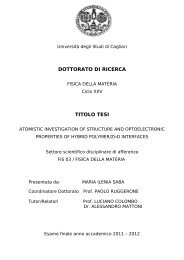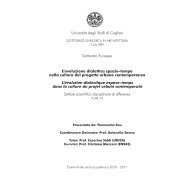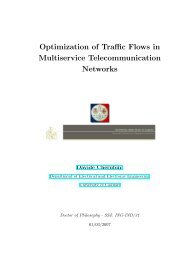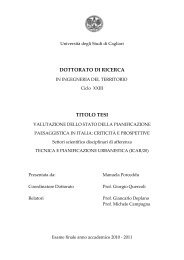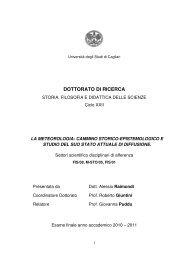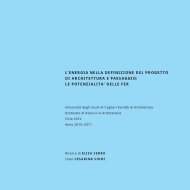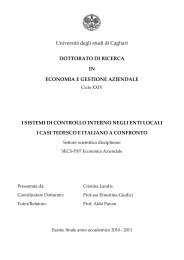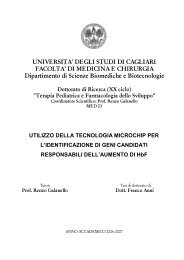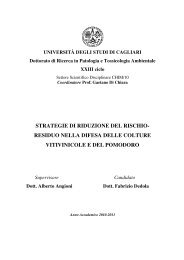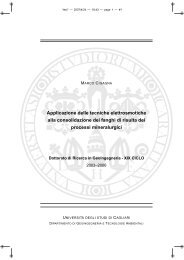The only truly alien planet is Earth. - UniCA Eprints - Università degli ...
The only truly alien planet is Earth. - UniCA Eprints - Università degli ...
The only truly alien planet is Earth. - UniCA Eprints - Università degli ...
Create successful ePaper yourself
Turn your PDF publications into a flip-book with our unique Google optimized e-Paper software.
infatti rientrano per esempio il ritorno di stili del passato e la loro coes<strong>is</strong>tenza con stili e atmosfere<br />
contemporanei, in architettura come in musica.<br />
Nella v<strong>is</strong>ione di Nietzsche ‘l’eterno e l’immutabile’ appartengono alla dimensione del<br />
dion<strong>is</strong>iaco 372 , fenomeno tipicamente romantico nel suo abbandonarsi alle passioni. L’esperienza<br />
estetica con l’avvento del romantic<strong>is</strong>mo cessa di essere percepita come apollinea, oggettiva, come<br />
nella tradizione classica, per divenire invece un’esplosione di sensazioni centrata sulla soggettività<br />
del singolo individuo, uno Sturm und Drang [letteralmente ‘tempesta e impulso’]:<br />
<strong>The</strong> pursuit of aesthetic experience as an end in itself became, of course, the hallmark of the<br />
romantic movement (as exemplified by, say, Shelley and Byron). It generated that wave of “radical<br />
subjectiv<strong>is</strong>m”, of “untrammelled individual<strong>is</strong>m”, and of “search for individual self-realization”<br />
which, in Daniel Bell’s (1978) view, has long put modern<strong>is</strong>t cultural behaviour and art<strong>is</strong>tic practices<br />
fundamentally at odds with the protestant ethic 373 .<br />
Ma come dimostra la citata parabola reaganiana, la sostituzione dell’etica con l’estetica<br />
costitu<strong>is</strong>ce un fenomeno degenerativo, caratter<strong>is</strong>tico anch’esso del postmoderno, per cui l’apparenza<br />
si sostitu<strong>is</strong>ce alla sostanza, e il simulacro prende il posto dell’originale, l’attore sostitu<strong>is</strong>ce lo<br />
stat<strong>is</strong>ta 374 . È interessante notare come Philip K. Dick avesse già pensato a qualcosa di simile nel suo<br />
romanzo <strong>The</strong> Simulacra (1964), nel quale il Presidente è un androide che viene mostrato alla<br />
popolazione come l’uomo al comando, mentre in realtà il potere è gestito dalla first lady Nicole<br />
Thibodeaux. Segnaliamo, en passant, una significativa convergenza tematica tra Dick e Ballard. In<br />
questo romanzo lo scrittore americano presenta una società nella quale l’esercizio della psichiatria è<br />
severamente proibito. La stessa situazione è descritta, circa due anni prima, nel racconto di Ballard<br />
“<strong>The</strong> Insane Ones” (1962). Non a caso i due scrittori condividono un forte interesse per il rapporto<br />
tra mente conscia e inconscio, sanità mentale e follia, tra realtà e simulazione, realtà oggettiva e<br />
percezione soggettiva, così come per le tematiche legate alla manipolazione della coscienza<br />
dell’individuo attraverso i mass media o la tecnologia. Tematiche di cui si è occupato anche<br />
William S. Burroughs, meritandosi anche per questo la stima, ricambiata, dello scrittore britannico.<br />
372 «<strong>The</strong> eternal and immutable essence of humanity found its proper representation in the mythical figure of Dyon<strong>is</strong>us:<br />
“to be at one and the same time ‘destructively creative’ (i.e. to form the temporal world of individualization and<br />
becoming, a process destructive of unity) and ‘creatively destructive’ (i.e. to devour the illusory universe of<br />
individualization, a process involving the reaction of unity)”.» Ivi, p. 16.<br />
373 Ivi, p. 19.<br />
374 «It may be that for most people ‘reality’ and ‘truth’ are now outmoded concepts, whose functional usefulness has<br />
been crushed under sheer weight of numbers of images, illusions, sitcoms, advert<strong>is</strong>ements and roles proffered by media<br />
everywhere. When the most powerful ‘role’ in the world <strong>is</strong> occupied by a “B-grade actor”, and th<strong>is</strong> role <strong>is</strong> accepted by<br />
the vast majority of people as credible and real, obviously the most fundamental d<strong>is</strong>tinctions between illusion and<br />
reality no longer matter.» V. Vale, Andrea Juno (a cura di), in Re/Search n. 8/9, op. cit., p. 88.<br />
- 114 -



